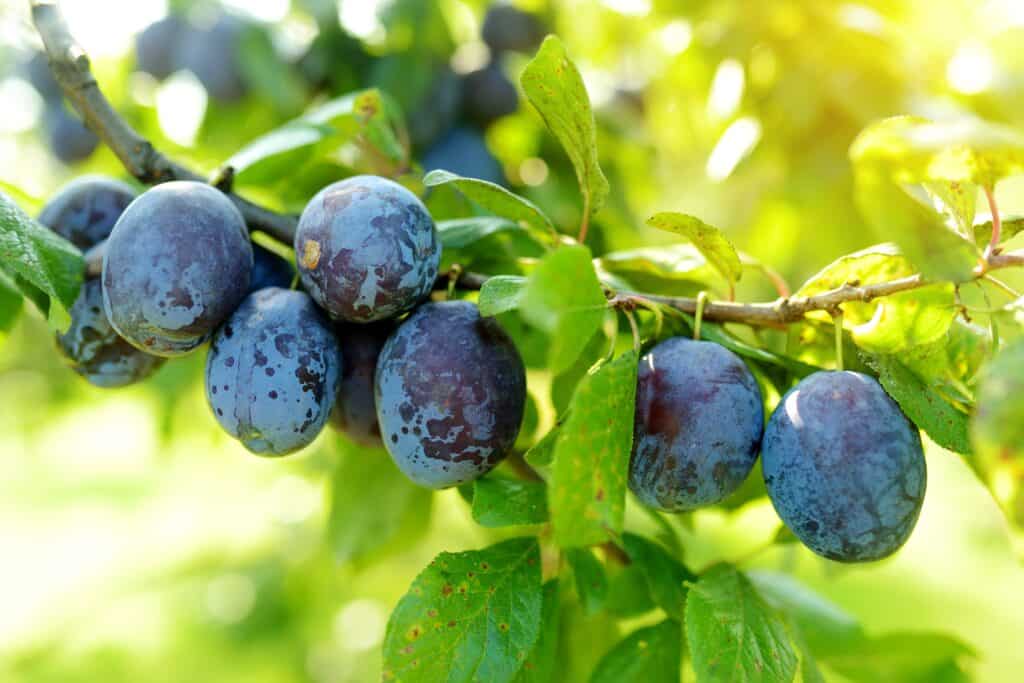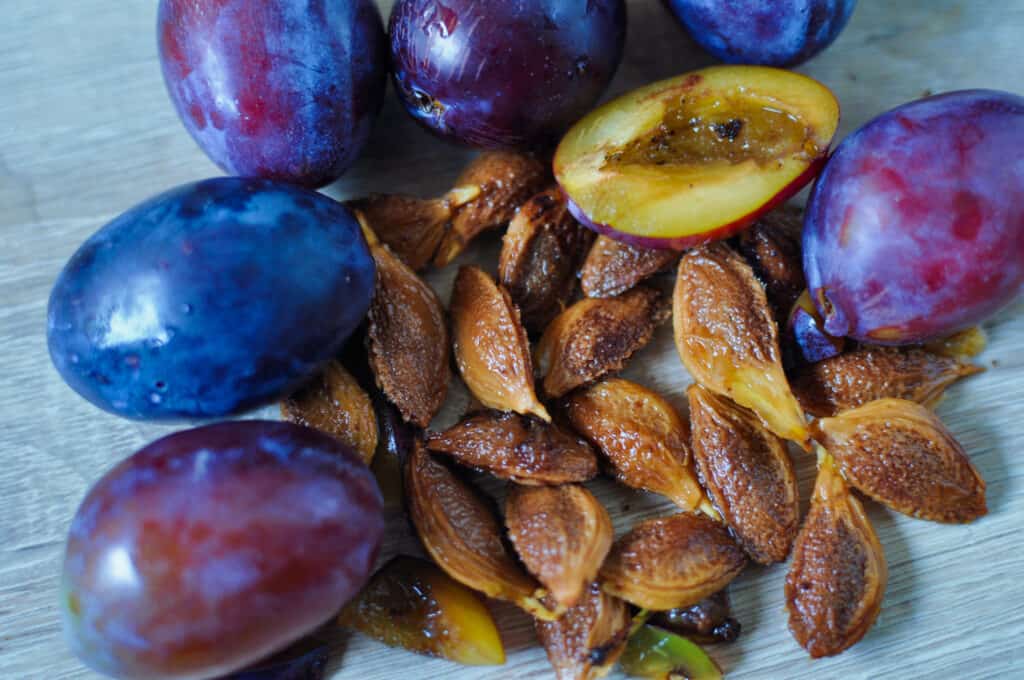Prunes are a nutritious snack that serves as an excellent source of fiber and vitamins for humans. However, are these dried snacks a good food option for our furry companions? Those wondering whether or not dogs can eat prunes may be surprised to learn that their high fiber content makes them a risky snack for dogs that are better avoided
Read on to learn why prunes aren’t a good snack choice for dogs and how to respond if your dog accidentally eats a few bites.

Feeding your dog prunes is not recommended.
©New Africa/Shutterstock.com
What are Prunes?
Prunes are pitted, dried plums that have been soaked in water. They’re often eaten as a snack or added to other recipes for a kick of sweet flavor. Prunes contain plenty of antioxidants and are high in fiber and natural sugars, providing a healthy source of sweetness for humans who need to avoid added sugar. Thanks to their nutritional content, prunes help supplement iron, vitamin A, and other minerals involved in healthy human bowel movements and also alleviate diarrhea or vomiting.

Prunes start out as plums!
©MNStudio/Shutterstock.com
Prunes are either prepared fresh or eaten dehydrated, usually coated with extra sugar to help retain their moisture.
Can Dogs Eat prunes?
Despite all the health benefits they offer humans, prunes are a less-than-ideal choice for our dog companions. Their high sugar content can cause severe gastrointestinal problems such as flatulence, upset stomach, and diarrhea. If your dog gets into some prunes and develops an upset stomach, immediately contact your veterinarian for the next steps.
Can I feed my dog prunes for constipation?
Prunes are not a good choice for addressing constipation issues in dogs, even though they’re beneficial in this regard for humans. Prunes aren’t as toxic as grapes or raisins to pups, but it’s still difficult for canines to digest their high sugar and fiber content. Look elsewhere if you’re looking to help your dog achieve healthy bowel movements.

Prunes are not a good choice for addressing constipation in dogs.
©Javier Brosch/Shutterstock.com
Risks of Feeding Dogs Prunes
While prunes aren’t inherently toxic to dogs, they present various health risks and should generally be avoided. Here are some key considerations to know before feeding your dog any prunes.
Choking hazard
Prunes are just large enough to block the esophageal passage in small dogs and cause them to choke. Their sugar content can cause prunes to clump together, making it easy for them to lodge in a dog’s windpipe, no matter their size. This same factor presents a risk of gastrointestinal blockage as well. A prune lodged in your dog’s digestive pathways, can lead to painful cramping, loss of appetite, and bloat.
High sugar content
The high sugar levels in prunes quickly add up. Too much sugar in your pup’s diet can lead to digestive and weight-related health issues such as obesity, diabetes, hyperglycemia, joint problems, and more. Even a small amount of prunes can cause diarrhea or flatulence in your dog, so it’s best to avoid them.

Too much sugar in your pup’s diet can lead to digestive and weight-related health issues such as obesity, diabetes, and joint problems.
©Sheila Fitzgerald/Shutterstock.com
Pits are toxic
Plum pits contain trace levels of cyanide in them. Consumed at high levels, prune pits can lead to cyanide poisoning, presenting a deadly threat to our canine companions. While most pits are removed during the pruning process, not all dried prunes are pitless. Err on the side of caution by keeping pit-free prunes in your house, especially if your dog is liable to sneak treats off the countertop.

Consumed at high levels ,prune pits can lead to cyanide poisoning, presenting a deadly threat to our canine companions.
©IchBinJeffee/Shutterstock.com
What To Do If Your Dog Eats Prunes
If your dog accidentally gets into some prunes, monitor your pup for the next day or two to see how they respond. Some dogs will successfully pass the food without incident. However, if your pet shows symptoms of an upset stomach, call your vet to determine your next steps. It’s always a good idea to keep fresh water available, so your dog can stay hydrated while sick.
In the case of eating prune pits, immediately call your vet and monitor your dog’s behavior. If your dog doesn’t vomit within 12 hours after eating, they’ve likely avoided prune poisoning, which is rare but does occur. Signs of poisoning include rapid breathing, lethargy, seizures, and even unconsciousness, so it’s best to react with an abundance of caution.

If your dog accidentally gets into some prunes, monitor your pup for the next day or two to see how they respond.
©Masarik/Shutterstock.com
What Can Dogs Eat for Constipation?
Rather than eating prunes, many alternate options exist for helping your dog overcome constipation. A home remedy is just as good as a vet-approved supplement, but be sure to consult your vet in case the constipation is a sign of a more serious health concern.
Common home remedies for constipation in dogs include:
- Canned pumpkin
- Raw, canned dog food
- Extra water
- Exercise
- Bran cereal
While prunes bestow many health benefits on human, dogs would do better to avoid them. The fruit’s high levels of sugar, fiber and potential ability to poison pooches all pose risks to your pup. All in all, it’s best to avoid feeding your dog prunes and opt for a healthier, safer snack.
Up Next
The photo featured at the top of this post is © Nataly Studio/Shutterstock.com
Ready to discover the top 10 cutest dog breeds in the entire world?
How about the fastest dogs, the largest dogs and those that are -- quite frankly -- just the kindest dogs on the planet? Each day, AZ Animals sends out lists just like this to our thousands of email subscribers. And the best part? It's FREE. Join today by entering your email below.
Sources
- researchgate.net, Available here: https://www.researchgate.net/publication/15203514_Effect_of_Level_and_Source_of_Dietary_Fiber_on_Food_Intake_in_the_Dog
- a-z-animals, Available here: https://a-z-animals.com/blog/what-foods-can-dogs-eat-safely-and-which-are-dangerous/
- aka.org, Available here: https://www.akc.org/expert-advice/health/dog-constipation/
- permd.com, Available here: https://www.petmd.com/dog/conditions/endocrine/c_dg_high_blood_sugar
Thank you for reading! Have some feedback for us? Contact the AZ Animals editorial team.






